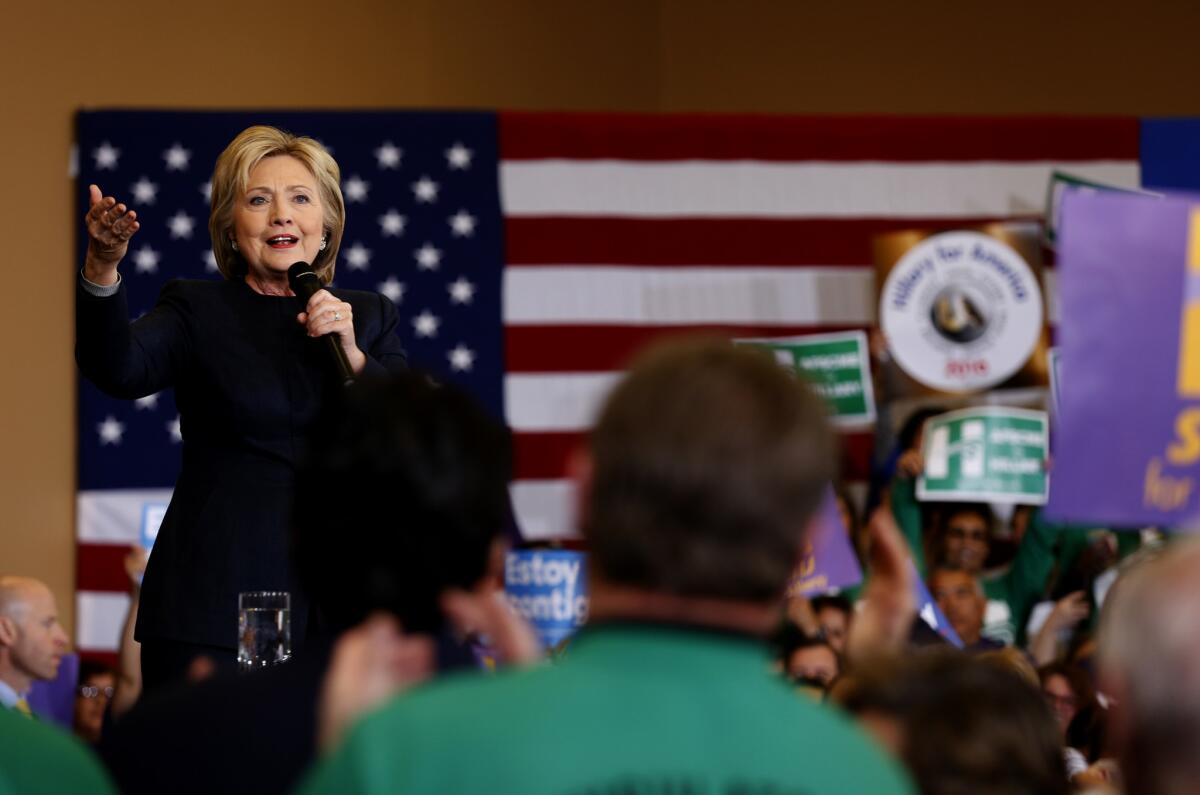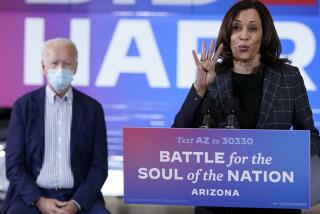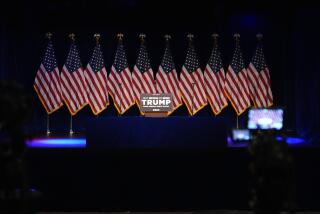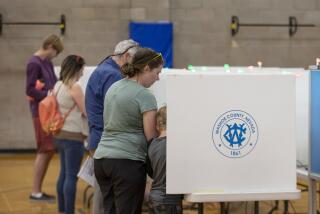Nevada will be a crucial test for the Clinton and Sanders campaigns

Hillary Clinton speaks to a crowd at Painters Hall in Henderson, Nev.
By the time Bernie Sanders launched his challenge to Hillary Clinton in May, her campaign team had already been in Nevada for a month, knocking on doors, dialing voters and cajoling endorsements from local leaders.
Nevada was supposed to be Clinton’s “firewall,” a state where she could stop Sanders’ progress no matter what happened in Iowa or New Hampshire. But with both presidential hopefuls headed to the state this weekend to campaign before the Feb. 20 Democratic caucus, Clinton’s sure bet is off.
After suffering a double-digit defeat to Sanders in New Hampshire, Clinton’s campaign staffers are quietly lowering expectations here, saying they are preparing for a race that is going to be close. They acknowledge that Sanders has caught up quickly since launching his Nevada effort in November, opening nearly twice as many field offices as Clinton and outspending her on television.
Although the number of convention delegates at stake is small, a loss for Clinton here would be big.
Clinton’s campaign wrote off her New Hampshire defeat to circumstances that uniquely favored Sanders: The electorate was dominated by the white liberal voters who make up the core of his support; rules allowed independents to vote in the primary; Sanders hails from neighboring Vermont.
In Nevada, her team has no excuses.
About a third of Democratic caucus-goers are Latino or African American, two groups among which Clinton has historically done well. And her top aides have extensive experience in the state. Her national campaign manager, Robby Mook, ran Clinton’s Nevada operation in 2008 and has hired several veterans of Barack Obama’s campaign that year. In 2008, Clinton won the popular vote in the state’s caucuses, but Obama ended with one more delegate.
The race is also a test for Sanders, who must prove he can appeal to nonwhite audiences who are crucial to winning a Democratic nomination and the general election. A win here would show that he can go beyond the Ben & Jerry’s constituency that has flocked to his campaign.
“We’re the first state in the contest that actually reflects what this country looks like and where this country is heading,” said Leo Murrieta, a political consultant who specializes in outreach to the state’s growing Latino population and who is backing Clinton. “Nevada is a perfect case study.”
The winner in Nevada will gain momentum going into the South Carolina Democratic primary Feb. 27 and the March 1 primaries, when a dozen states vote, including several in the South with large African American Democratic electorates.
“Momentum is a huge deal in presidential campaigns,” said Bill Carrick, a Democratic strategist who is not working for either candidate, although he once worked for Bill Clinton. “Whoever captures it has got a big advantage.”
With little reliable public polling in Nevada, it’s hard to say who has that momentum now.
“She has people who know the state and know what they’re doing,” Jon Ralston, a longtime political analyst in Nevada, said of Clinton. He said the Clinton campaign is paying close attention this year to rural Nevada counties that have smaller populations but can supply crucial delegates. Former President Clinton was recently dispatched to the small Mojave Desert city of Pahrump to campaign for his wife.
Clinton is also making an overt pitch to Nevada Latinos, who could make up as much as 20% of this year’s Democratic electorate, Ralston predicts. Many of her campaign stops in the state have been geared to Latinos, and her campaign has launched a Latina-to-Latina phone bank program as well as a Spanish-language caucus-training program called “Caucus Conmigo.”
“Our strategy has been to build a campaign that really looks and feels like Nevada,” said Clinton campaign spokesman Tim Hogan, who said he expects Clinton to prevail after “a close race.”
But several aspects of the Nevada caucus process may work to Sanders’ advantage.
The state offers same-day registration for voters; in 2008 a quarter of voters registered on caucus day. The prospect that a hotly contested caucus will cause more voters to show up and register as Democrats is one reason the state’s most powerful Democrat, Senate Minority Leader Harry Reid, has held out on endorsing either candidate, he said recently.
“I think it will be very close,” Reid said when asked about the contest during a CNN interview Thursday.
The caucuses also allow voting by 17-year-olds who will turn 18 by the time of the November election. For a campaign like Sanders’, powered in part by the energy of young, first-time voters, that’s a good thing.
The Sanders team also believes his campaign promises to tax Wall Street will connect with voters in Nevada, a state that is only now recovering from the home foreclosure crisis and the Great Recession.
Sanders spokeswoman Rania Batrice, one of dozens of Sanders staffers to land in the state in recent days, said their campaign is ready to make up for lost time with enthusiasm.
“Hillary got a big, big head start,” Batrice said. “But as we’ve seen in other parts of the country, that doesn’t necessarily make a difference.”
For more on campaign 2016, follow @KateLinthicum.
ALSO
Democrats clash in first post-New Hampshire debate
More to Read
Get the L.A. Times Politics newsletter
Deeply reported insights into legislation, politics and policy from Sacramento, Washington and beyond. In your inbox three times per week.
You may occasionally receive promotional content from the Los Angeles Times.







